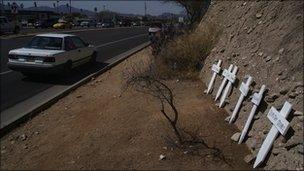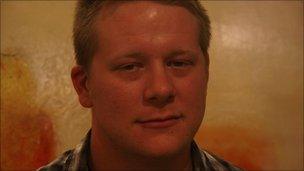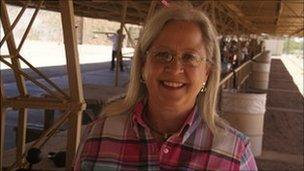Arizona shooting: Would more guns save lives?
- Published
- comments

A makeshift memorial commemorates the six people killed in January's shooting
Two months have passed since six people were killed and a dozen injured in a gun attack in Tucson, Arizona, directed at Congresswoman Gabrielle Giffords. The BBC's Paul Adams looks at where the debate over gun control now stands in the state.
Outside Safeway, at the junction of Oracle and Ima, in northern Tucson, almost all traces of the tragedy have gone.
Across the busy highway, a simple line of white crosses, each bearing the name of a victim, stands out against a rocky bank, the only obvious reminder of an outrage which sent shockwaves through this desert city.
But two months to the day since a gunman opened fire at Gabrielle Gifford's "Congress in your Community" event, the tributes and flowers have all been taken away, to make room for a permanent memorial still being planned.
On Wednesday, Jared Lee Loughner will appear in court, where he faces 49 separate federal charges over the attack.
Joe Zamudio was in the neighbouring Walgreens pharmacy on 8 January when he heard the first shots. At first he thought they were fireworks.

Joe Zamudio believes in firearms as a means to protect oneself and others
His actions in the seconds that followed - seconds in which he thought of intervening, released the safety catch on his own pistol and ran towards the scene - were much reported at the time.
Presence of mind and a keen eye ensured that Mr Zamudio did not open fire on a man he saw holding a gun and threatening to shoot someone.
But the man with the gun was not the suspect. The shooter had already been disarmed.
Joe knows he could have made a terrible mistake.
But the episode doesn't change the way he thinks about his gun. If anything, it reinforces his belief in the weapon as a tool to defend yourself, and others.
"That's why you have it," he insists.
"I know I wasn't able to stop him from hurting anyone he hurt. That bothers me."
Concealed weapons
At the time of the shooting, hundreds of gun-related measures were being debated by lawmakers across the country.
About 60% of them would expand gun rights, not restrict them.
In Arizona itself, there are 16 bills still under consideration, mostly aimed at liberalising gun regulations.
One, House Bill 2001, would allow for concealed weapons to be carried on college campuses by gun owners with valid permits.
Ron Gould, a Republican senator in Arizona's state legislature, is one of the prime movers behind efforts to expand gun rights.
"The best thing that we can do is be able to meet force with force," he says, noting that criminals will generally disregard signs declaring public places to be gun-free zones.
The senator deploys a Cold War analogy to make his point.
"For over 50 years now, the doctrine of mutually assured destruction has kept nuclear weapons from being used," he says.
But the legislature's moves to expand gun rights (another move would allow firearms immediately outside school grounds) are causing alarm, even among some proud gun owners.

Gun instructor Carol Ruh is concerned that many people are not properly trained to carry firearms
"It's like the old Wild West," says Carol Ruh, president of the Arizona Women's Shooting Association and an experienced gun instructor.
Against the backdrop of gunshots at a shooting range just off Carefree Highway, north of Phoenix, she explains that while she doesn't oppose "concealed carry" on campus, she believes Arizona is making it far too easy for anyone to carry a gun, with little or no training.
"If you are going to put this gun on your person you damn well better make sure you know what you're doing," she says.
"It's great to have the freedoms that we do. But there's a price to be paid, and it's just common sense just to get the education."
Some go further. Back in Tucson, Pima County Sheriff Clarence Dupnik has long been an outspoken critic of Arizona's liberal gun laws.
"They're hell-bound to try and put guns in schools," he says of Mr Gould and his Republican colleagues.
"If they're successful in my opinion at some point in the future there's going to be a 'Gunfight at OK Corral' in some classroom."
Harrowing experience
The legislative effort is particularly painful to Colin Goddard, a survivor of the 2007 Virginia Tech campus shootings.
Mr Goddard was shot four times and was one of only seven survivors from a French class of 17 students.
Now assistant director for federal legislation with the Brady Campaign to Prevent Gun Violence, the 25-year-old former student has made a film about his own harrowing experience and the ease with which weapons can be bought at often poorly-regulated gun shows across the country.
He says he's not opposed to the right of law-abiding citizens to bear arms, but he doesn't like the idea of concealed weapons, especially on campus.
"That is not a right, that is a privilege that we grant to certain people who meet certain requirements," he says. "And I'm saying those requirements are very low."
And to those who cite the constitution as a justification for expanded gun rights, Mr Goddard has a pointed response.
"The second amendment is the only amendment with the word 'regulated' in it. And I'd say that's there for a reason."
In the debate over regulation, Arizona is one of several states moving towards fewer restrictions.
As he wrestles with his own experience, Mr Zamudio says he's ready to take up his gun again.
"It can happen any time," he says, of events like the one he witnessed two months ago.
"People take out their problems on other people. If you don't like your life and you want to act out because of it, then I'm going to put you down."